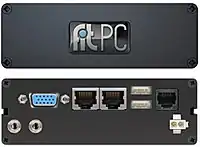| Media | 2.5" 160 GB SATA hard disk mini-SD slot |
|---|---|
| Operating system | Linux Mint Windows XP Windows 7 |
| CPU | Intel Atom Z550 (2 GHz) / Z530 (1.6 GHz) / Z510 (1.1 GHz) |
| Memory | 1 GB DDR2 Up to 2 GB |
| Display | DVI 1920x1200 through HDMI connector |
| Connectivity | 802.11b/g Wi-Fi 1000baseT Ethernet (2x GbE in fit-PC2i) 6 x USB 2.0 ports (4 in fit-PC2i) line-out, line-in, microphone S/PDIF (and RS-232 in fit-PC2i) |
| Power | 6W @ 12 V DC |
| Dimensions | 10.1 x 11.5 x 2.7 cm |
| Media | 2.5" 60 GB IDE hard disk |
|---|---|
| Operating system | Ubuntu Gentoo Linux Windows XP |
| CPU | Geode LX 800 |
| Memory | 512 MB DDR SDRAM |
| Display | VGA 1920x1440 |
| Connectivity | 802.11b/g Wi-Fi 100BASE-TX Ethernet 3 x USB 2.0 ports Headphones, microphone Serial |
| Power | 6W @ 12 V DC |
| Dimensions | 10 x 11 x 3 cm |
 | |
| Media | 2.5" 40 GB (older versions) / 60 GB (newer versions) IDE hard disk |
|---|---|
| Operating system | Ubuntu Gentoo Linux Windows XP |
| CPU | Geode LX 800 |
| Memory | 256 MB DDR SDRAM |
| Display | VGA 1920x1440 |
| Connectivity | 2 x 100BASE-TX Ethernet 2 x USB 2.0 ports Headphones, microphone Serial |
| Power | 5W @ 5 V DC |
| Dimensions | 12 x 11.6 x 4 cm |
The fit-PC is a small, light, fan-less nettop computer manufactured by the Israeli company CompuLab.
Many fit-PC models are available. fit-PC 1.0 was introduced in July 2007, fit-PC Slim was introduced in September 2008, fit-PC 2 was introduced in May 2009, fit-PC 3 was introduced in early 2012, and fit-PC 4 was introduced spring 2014. The device is power-efficient (fit-PC 1 was about 5 W) and therefore considered to be a green computing project,[1] capable of using open source software and creating minimal electronic waste.[2][3][4]
Current models
fit-PC2
On February 19, 2009, Compulab announced the fit-PC2, which is "a major upgrade to the fit-PC product line".[5] Detailed specifications for the fit-PC2 include an Intel Atom Z5xx Silverthorne processor (1.1/1.6/2.0 GHz options), up to 2GB of RAM, 160GB SATA Hard Drive, GigaBit LAN and more. The fit-PC2 is also capable of HD video playback. Its declared power consumption is only 6W, and according to the manufacturer, it saves 96% of the power used by a standard desktop. fit-PC2 is the most power efficient PC on the Energy-Star list. The fit-PC2 is based on the GMA 500 (Graphics Media Accelerator). Unfortunately the open source driver included in Linux kernel 2.6.39 does not support VA-API video or OpenGL/3D acceleration.[6] The fit-PC2 is being phased out and is being replaced by the fitlet, the fitlet was designed to replace the groundbreaking (and still popular) CompuLab fit-PC2.[7]
fit-PC2i
On December 2, 2009, Compulab announced the fit-PC2i, a fit-PC2 variation targeting networking and industrial applications.[8] fit-PC2i adds a second Gbit Ethernet port, Wake-on-LAN, S/PDIF output and RS-232 port, has two fewer USB ports, and no IR.
fit-PC3
The fit-PC3 has been released early 2012. See the fit-PC3 article.
fit-PC4
The fit-PC4 has been released spring 2014.
fitlet
The fitlet has been announced January 14, 2015.[9] It has 3 CPU/SoC variations, and 5 feature variations, though only 7 models have been announced so far.
Obsolete models
fit-PC Slim
On September 16, 2008, Compulab announced the Fit-PC Slim, which at 11 x 10 x 3 cm is smaller than fit-PC 1.0.
Hardware
fit-PC Slim uses 500 MHz AMD Geode LX800 processor and has 512mb soldered-on RAM. The computer includes a VGA output, a serial port with a custom connector, Ethernet, b/g WLAN, and 3 USB ports (2 on the front panel). The system has an upgradeable 2.5" 60GB ATA hard drive.
Software
fit-PC Slim has General Software BIOS supporting PXE and booting from a USB CDROM or USB thumb drive. It is pre-installed with either Windows Vista or with Ubuntu 8.10 and Gentoo Linux 2008.0 . Also Windows Embedded can be used, or pre-installed on a FlowDrive.
Availability
The fit-PC Slim end-of-life was announced on 19 June 2009 with the general availability of fit-PC2.
fit-PC 1.0
fit-PC 1.0 is an earlier model that has the following differences
- Limited to 256mb RAM
- No Wi-Fi
- Dual 100BaseT Ethernet
- Larger form factor - 12 x 11.6 x 4 cm
- Only 2 USB ports
- Hard disk is upgradeable
- No power button and indicator LEDs
- 5 V power supply
See also
- Trim-Slice, an ARM mini-computer also made by CompuLab
- Industrial PC
- Media center (disambiguation)
- Media PC
- Nettop
References
- ↑ Parveen, Farzana; Singh, Rahul; Singh, Preeti (April 2015). "Green Computing: an Exploration of Approaches & Implementations". International Journal of Advance Research in Science and Engineering (IJARSE). 4 (1): 697–702. CiteSeerX 10.1.1.1050.5217.
- ↑ "Tiniest Linux system, yet?". LinuxDevices.com. September 16, 2008. Archived from the original on September 19, 2008. Retrieved 2008-09-27.
- ↑ "Tiny PC sips power, runs Linux". LinuxDevices.com. July 19, 2007. Archived from the original on June 29, 2012. Retrieved 2008-02-21.
- ↑ "Fit PC—A Tiny Linux PC that Fits Anywhere". ExtremeTech. Archived from the original on 2008-02-15. Retrieved 2008-02-21.
- ↑ "New fit-PC model - fit-PC2". CompuLab. Retrieved 2009-02-19.
- ↑ "An Open-Source Intel GMA 500 Driver Appears". Phoronix. Retrieved 2011-06-27.
- ↑ "Fitlet press release".
- ↑ "fit-PC2i announced - fit-PC2". CompuLab. Retrieved 2009-12-30.
- ↑ "fitlet announced - fitlet". CompuLab. Retrieved 2015-01-14.
